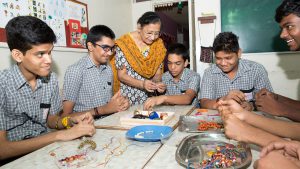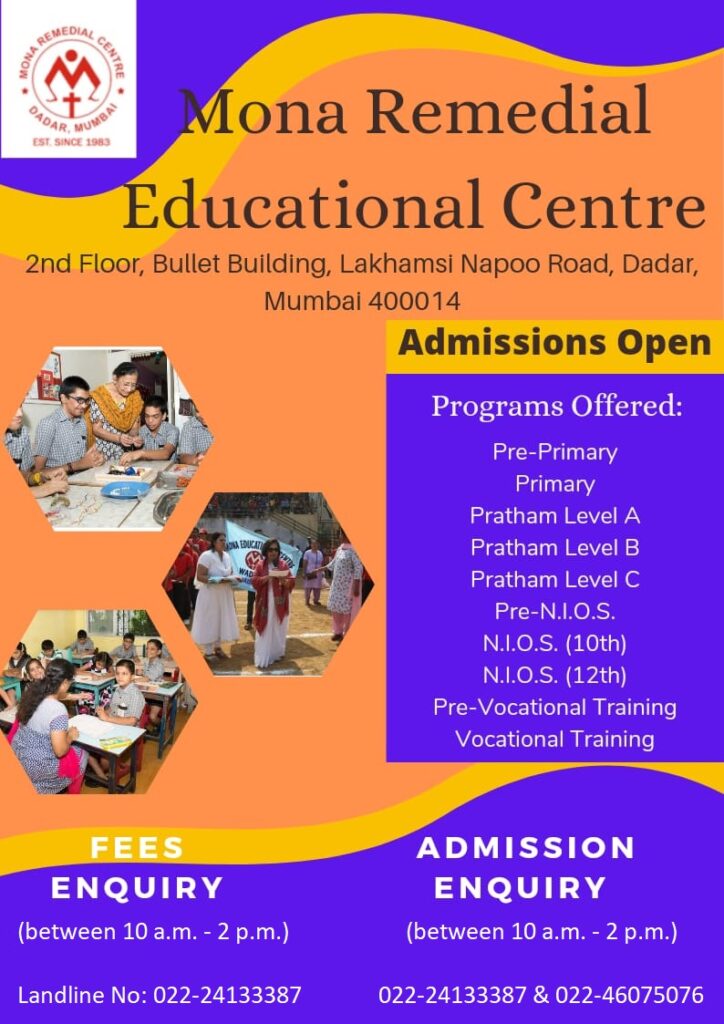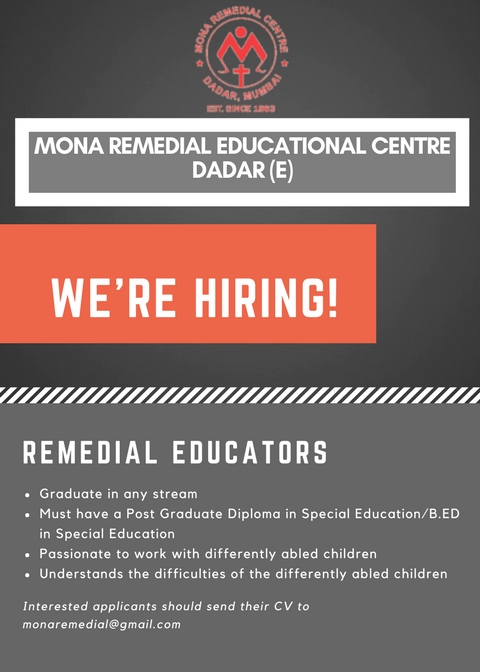ADMISSIONS
Admission Process
- Take appointment.
- At the time of consultation bring all the previous reports of the doctor.
- Formal or informal testing with our clinical psychologist.
- Recommendations for therapy, schooling, follow up or certifications.

Fees
- Admission fee (to be paid once only at the time of admission) Rs. 5,000/-.
- Fees per month Rs. 5,500/-.
- Activities fees yearly Rs. 2,600/-.
School Timings
08:00 AM- 01:40 PM
FAQS
- Two terms related to special and inclusive education that are most commonly used,are impairment and disability.
- Impairment refers to a lesser degree of complexity in the way our bodies work.
- Disability refers to inability or not being able to perform a task.
Intellectual disability is a term used when a person has certain limitations in mental functioning and in skills such as communicating, taking care of him or herself, and social skills. These limitations will cause a child to learn and develop more slowly than a regular child. Since specific disabilities, such as Autism Spectrum, intellectual impairments and learning difficulties are primarily associated with the working of the brain and/or how brain processes the information received,these are addressed under intellectual disabilities (sometimes called cognitive disabilities).
In MREC’s Child Guidance Clinic the different assessment can be done like-
Intellectual functioning, or IQ, is usually measured by a test called an IQ test. The average score is 100. People scoring below 70 to 75 are thought to have an intellectual disability. To measure adaptive behaviour, professionals look at what a child can do in comparison to other children of his or her age. Certain skills are important to adaptive behaviour. These are:
• daily living skills, such as getting dressed, going to the bathroom, and feeding one’s
self,
• communication skills, such as understanding what is said and being able to answer,
• social skills with peers, family members, adults, and others. This can be measured with formal and informal assessment.
There are level wise classes that impart curriculum ranging from basic literacy to NIOS secondary level examination. The child is provided curriculum as per his/her intellectual, academic capacity as well as the requirement for his/her future independence. Almost all students have different IQs-EQs. We try to execute our curriculum/program as per student’s requirement/abilities.
The National Institute of Open Schooling (NIOS) has launched the Open Basic Education (OBE) Programme, as an alternative educational programme, equivalent to the Elementary Education Programme of the formal education system.
- Age for Open Basic Education (OBE) programme is:
o Children below 14 years of age
o Adults above 14 years of age - The OBE Programme is offered at three levels:
o OBE level A : equivalent to class I-III
o OBE level B : equivalent to class IV-V
o OBE level C : equivalent to class VI-VIII
A NIOS or National Institute of Open school is a centralized board of educationwhich was designed by the central government in 1989. It holds examinations as a unified board for the whole country, similar to other boards. It was developed to provide better, flexible education to the rural areas and to provide vocational training for those who require it. MREC is one of the schools who have been training and enrolling students for the secondary exam since 1995 and for OBE level exams since 2015.
This is because it gives more flexibility and time for a child to study without pressure. The secondary exam can be given by the child in 5 years time. So they can give one subject per year if the need be. It gives more vocation oriented subjects such as Data Entry Operations which include Computer skills.
The children who are appearing for the N.I.O.S. generally get the following provisions (concessions) such as:
Extra timing
Any one language
Subjects to be appear in one year.
Permission of writer.
The students have to provide disability certificate to the NIOS regional office. According to the disability the concessions are given to the students. All the students cannot get all the concessions except extra timing and any one language.
After completing 14 years of age the student can appear for N.I.O.S. exam. But it depends on the child’s ability to cope up with the syllabus and his intellectual capacity.
In MREC the subjects offered at the secondary level are English, Home science, Data Entry Operations, Business Studies, Economics. Painting and Baking can be taken as an alternative to business studies and economics.
The individualized treatment plan will take into consideration both the immediate needs of the patient, and the long term prognosis for development. Following therapies are useful for a special need child.
Behavioural Therapy.
Physical Therapy.
Occupational Therapy.
Speech Therapy.
Music Therapy.
Remediation / remedial teaching.
Dance Therapy.
Sensory Integration Therapy.
The word remedial by both print and web definition, means to rectify, improve or remedy something. Whether it's math, reading, or spelling, defining the problem is as important as defining the fix! Assessment is the first step in working through a student & struggles, and there are several ways to initiate this process. After the assessment, the teacher teaches the child/student as per his capacity and pace. She adapts different ways so that the student can understand the concept easily. It makes use of one-on- one instruction, small group instruction.
Young people with intellectual disabilities should participate in the same range of activities as their age appropriate peers. Employment is most important because
- Having a job is important which enhances social status.
- Provides wages that is to have money to participate in other activities.
- Increases contacts and opportunities for other integrated activities.
- It is productive.
- Increases self esteem.
- Promotes individual growth.
To successfully obtain and maintain employment the student must be able to demonstrate skills in a corporate or commercial environment. Naturally vocational training is important for the persons having intellectual disability.
In MREC, Vocational training is provided as a part of the syllabus.


